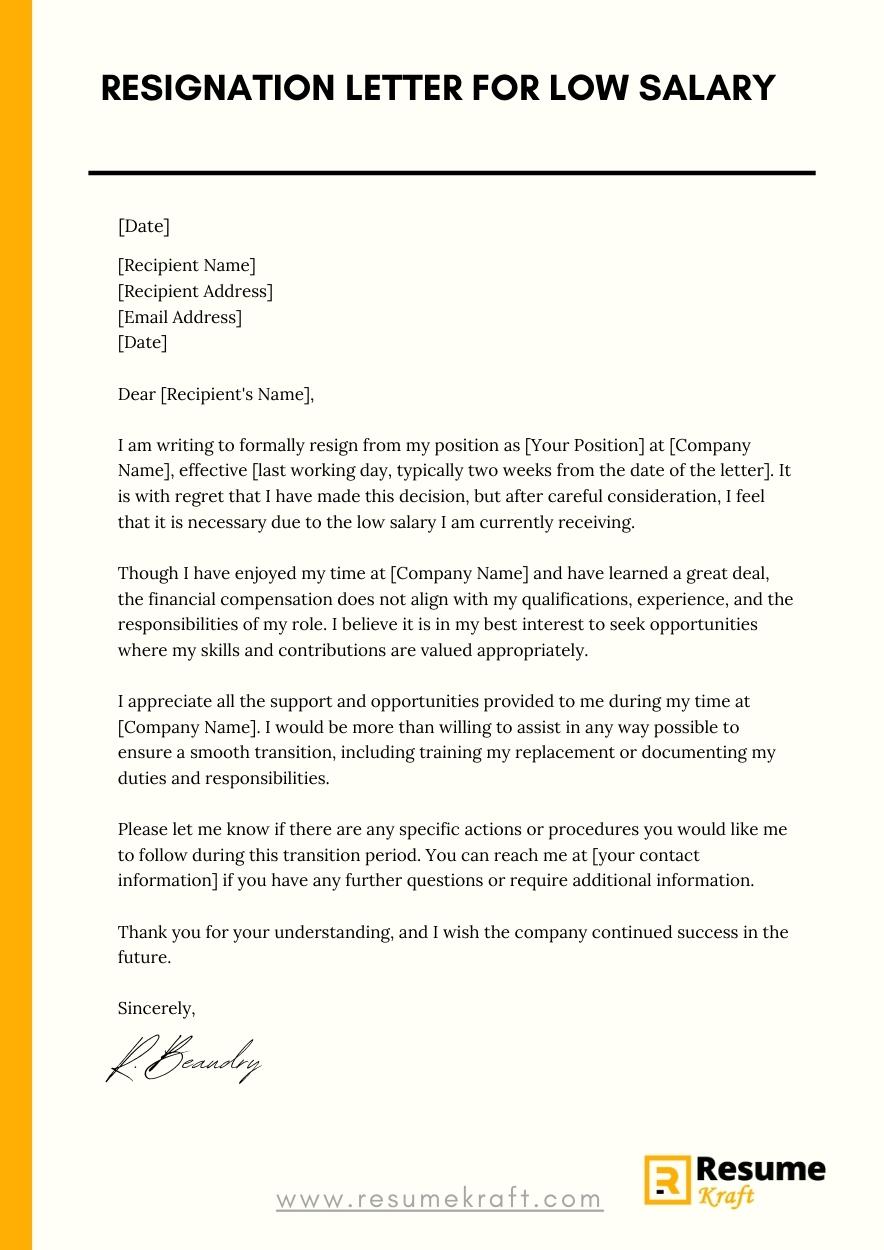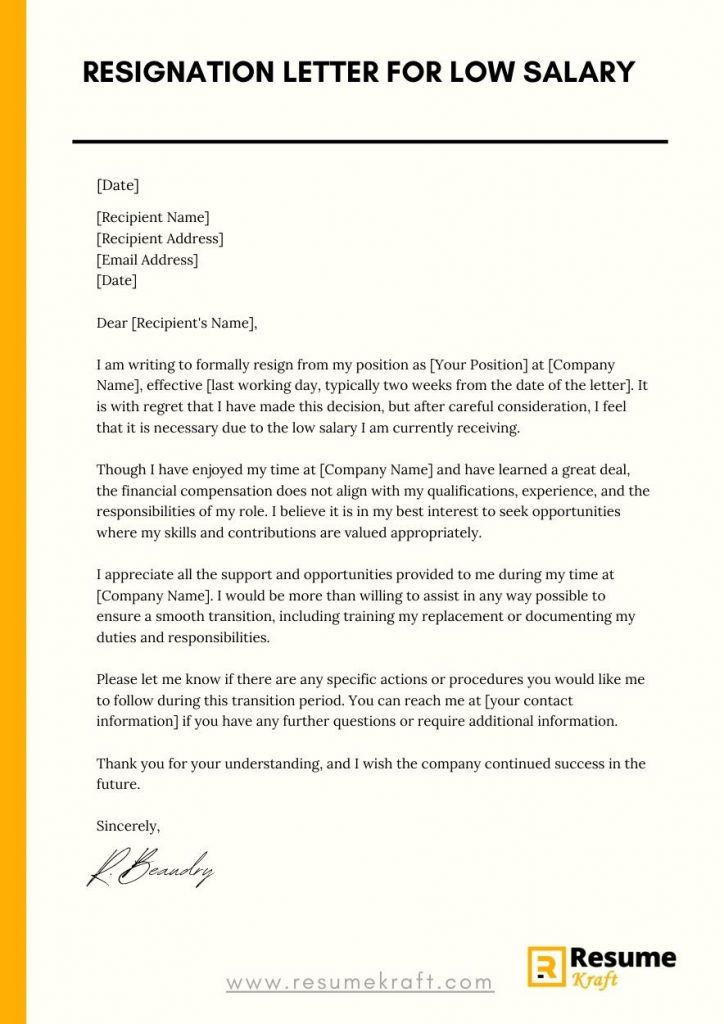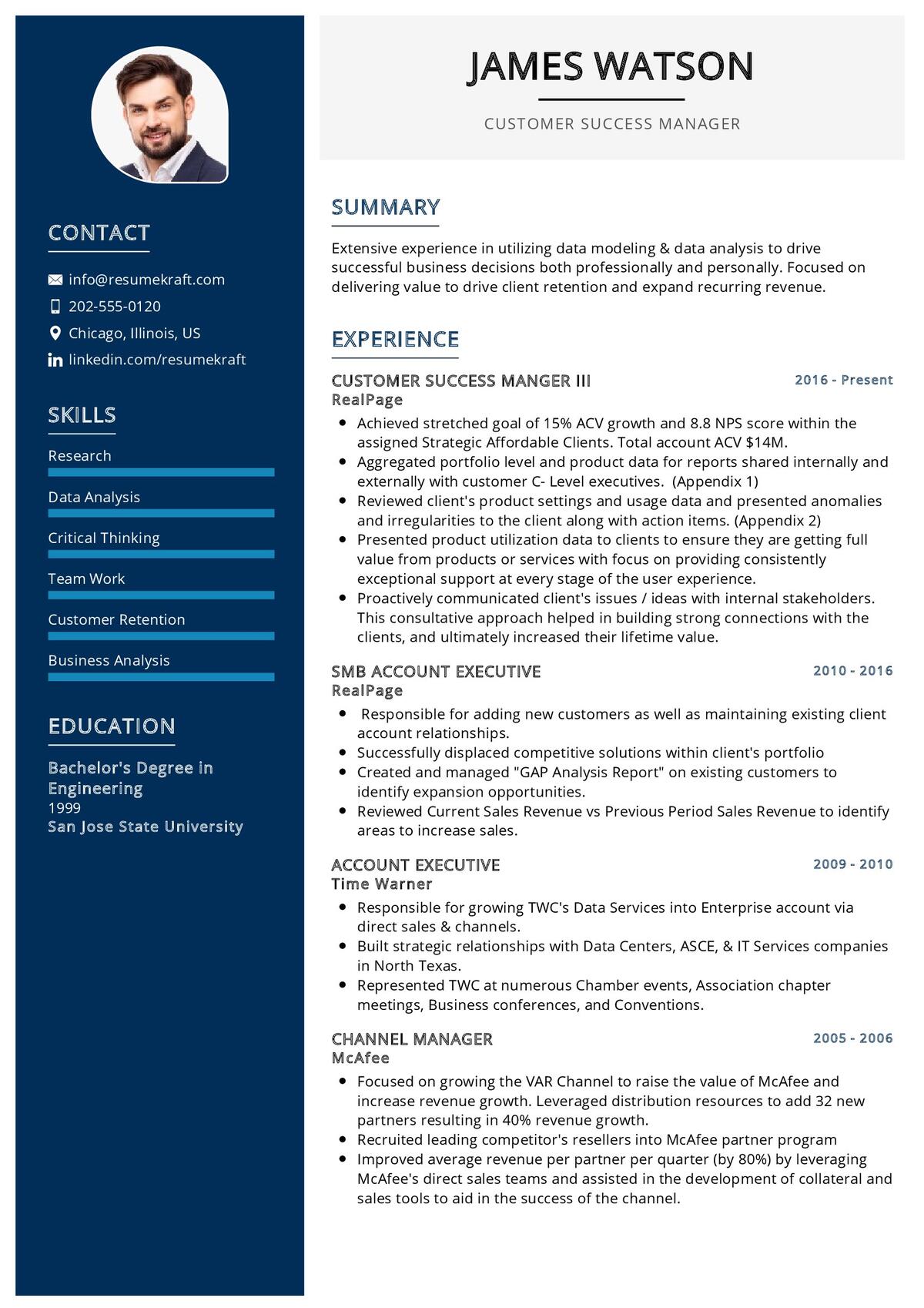
Are you considering resigning from your job due to a low salary? Writing a resignation letter can be a professional and respectful way to communicate your decision to your employer. In this article, we will guide you on what to include in a resignation letter for low salary, what not to include, how to format it, and provide you with some resignation letter samples to help you get started.
What to Include in a Resignation Letter for Low Salary
When writing a resignation letter for low salary, it is important to be clear, concise, and professional. Here are the key elements to include:
- Address: Begin the letter with your employer’s name, company name, and address. Include the date as well.
- Salutation: Address your letter to your immediate supervisor or the appropriate person in management.
- Statement of Resignation: Clearly state your intention to resign from your position due to the low salary.
- Reasons: Briefly explain the reasons behind your decision to leave, emphasizing the low salary as a significant factor.
- Appreciation: Express gratitude for the opportunities and experiences gained during your time with the company.
- Transition Plan: Offer your assistance in ensuring a smooth transition, if applicable. State your willingness to assist in training or handing over your responsibilities to a designated individual.
- Contact Information: Provide your contact information so that your employer can reach you for any further discussions or clarifications.
- Closing: Formalize your resignation letter by using a professional closing such as “Sincerely” or “Best Regards,” followed by your full name and signature.
What Not to Include in Your Resignation Letter for Low Salary
While it is important to be honest in expressing your reasons for resigning, it is equally important to maintain professionalism in your resignation letter. Here are a few things to avoid:
- Negative Comments: Refrain from expressing negative comments or criticizing your employer or the company. Focus on the decision being a personal choice rather than pointing fingers.
- Demands for Salary Increase: Avoid making demands for a salary increase as part of your resignation letter. This is a separate negotiation that should be discussed separately.
- Excessive Details: Keep your resignation letter concise and to the point. Avoid going into excessive detail or unnecessary explanations.
- Personal Grievances: If you have any personal grievances or complaints, it is better to address them through the appropriate channels rather than including them in your resignation letter.
How to Format a Resignation Letter for Low Salary
Formatting your resignation letter for low salary is important to ensure it looks professional. Here are some tips:
- Font and Size: Use a standard font such as Times New Roman or Arial, with a font size of 12.
- Margins: Maintain one-inch margins on all sides of the letter.
- Alignment: Align the text to the left and use single spacing.
- Length: Keep the letter to one page or less, if possible.
- Proofread: Before submitting your resignation letter, proofread it carefully to ensure there are no spelling or grammatical errors.
Resignation Letter for Low Salary Samples

Sample 1#: Printed Resignation Letter Sample
[Your Name]
[Your Address]
[City, State, ZIP code]
[Date]
[Supervisor’s Name]
[Position]
[Company Name]
[Company Address]
[City, State, ZIP code]
Dear [Supervisor’s Name],
I am writing to formally resign from my position as [Your Position] at [Company Name], effective [last working day, typically two weeks from the date of the letter]. It is with regret that I have made this decision, but after careful consideration, I feel that it is necessary due to the low salary I am currently receiving.
Though I have enjoyed my time at [Company Name] and have learned a great deal, the financial compensation does not align with my qualifications, experience, and the responsibilities of my role. I believe it is in my best interest to seek opportunities where my skills and contributions are valued appropriately.
I appreciate all the support and opportunities provided to me during my time at [Company Name]. I would be more than willing to assist in any way possible to ensure a smooth transition, including training my replacement or documenting my duties and responsibilities.
Please let me know if there are any specific actions or procedures you would like me to follow during this transition period. You can reach me at [your contact information] if you have any further questions or require additional information.
Thank you for your understanding, and I wish the company continued success in the future.
Sincerely,
[Your Full Name]
Sample 2#: Email Resignation Letter Example
Subject: Resignation – [Your Name]
Dear [Supervisor’s Name],
I hope this email finds you well. I am writing to formally resign from my position as [Your Position] at [Company Name], effective [last working day, typically two weeks from the date of the email]. I have carefully considered my decision, and I regretfully resign due to the low salary I am currently receiving.
During my time at [Company Name], I have enjoyed working with the team and have learned valuable skills. However, the salary does not align with the market rate for my position and level of experience. After careful consideration, I believe it is in my best interest to explore opportunities where I can be compensated fairly for my skills and contributions.
I am committed to a smooth transition and I am willing to assist in any way possible during this process. Please let me know if there are any specific tasks or procedures you would like me to complete before my departure.
I would like to express my gratitude to the company for the opportunities provided to me. I have genuinely enjoyed my time at [Company Name] and I appreciate the support and guidance I have received.
Thank you for your understanding and cooperation. If there is any additional information or actions needed from my end, please do not hesitate to contact me at [your contact information].
Best Regards,
[Your Full Name]
Sample 3#: Formal Resignation Letter Due to Low Salary
Subject: Resignation – [Your Name]
Dear [Supervisor’s Name],
I hope this letter finds you well. After careful consideration, I am writing to formally resign from my position as [Your Job Title] at [Company Name], effective [Last Working Day, typically two weeks from the date of the letter]. This decision has been influenced by financial concerns, specifically the current compensation, which I feel no longer meets my financial needs and expectations.
While I have truly enjoyed working at [Company Name], and I am grateful for the experience and opportunities provided, I believe it is in my best interest to seek new opportunities that better align with my career goals and financial requirements.
I am committed to ensuring a smooth transition during my notice period and will do my best to assist in handing over my responsibilities to ensure minimal disruption to the team.
Thank you for your understanding, and I hope that we can maintain a positive professional relationship in the future.
Sincerely,
[Your Name]
Sample 4#: Resignation Letter Due to Low Salary with Request for Improvement
Subject: Resignation – [Your Name]
Dear [Supervisor’s Name],
I hope this message finds you well. I am writing to formally resign from my position as [Your Job Title] at [Company Name], with my last working day being [Last Working Day].
The primary reason for my resignation is that the current salary no longer meets my financial needs or the value I bring to the organization. I have raised this concern previously, but unfortunately, a solution has not been reached.
I value the experience and skills I have gained during my time at [Company Name], and I am grateful for the opportunities presented. However, for my career growth and financial well-being, I believe it is time to pursue other opportunities.
I am more than willing to assist with the transition during the notice period and ensure that all ongoing projects are handled smoothly.
Thank you for your understanding and for the opportunity to be part of [Company Name].
Warm regards,
[Your Name]
Sample 5#: Resignation Letter Due to Low Salary with Professional Tone
Subject: Resignation – [Your Name]
Dear [Supervisor’s Name],
I am writing to formally resign from my position as [Your Job Title] at [Company Name], effective [Last Working Day]. After careful reflection, I have decided to leave the company due to financial reasons. Specifically, the current salary does not align with my cost of living or professional expectations.
I appreciate the support and opportunities I have received during my time at [Company Name], and I am thankful for the chance to work alongside such a talented team. However, I feel it is time to seek opportunities that provide better financial stability and career advancement.
Please let me know how I can assist in ensuring a smooth transition over the coming weeks. I am happy to help with the handover of my duties to ensure continuity for the team.
Thank you for your understanding.
Sincerely,
[Your Name]
Key Takeaways
When writing a resignation letter for low salary, it is important to be professional, concise, and maintain positive communication. Include the essential elements such as your resignation statement, reasons for leaving, appreciation, and contact information. Avoid negative comments, salary demands, and excessive details. Format the letter with a standard font, appropriate alignment, and proofread it carefully before submission.
Planning to Write a Resume?
Check our job winning resume samples


Frequently Asked Questions
1. How should I address my resignation letter for low salary?
You should address your resignation letter to your immediate supervisor or the appropriate person in management.
2. Can I express my frustrations about the low salary in my resignation letter?
While you can mention the low salary as a reason for your resignation, it is important to maintain a professional tone and avoid expressing frustrations or making negative comments.
3. Should I demand a salary increase as part of my resignation letter?
It is not recommended to make demands for a salary increase in your resignation letter. This is a separate negotiation that should be discussed separately.
4. How long should a resignation letter be?
Ideally, a resignation letter should be kept to one page or less.
5. Is it necessary to offer assistance during the transition period?
Offering assistance during the transition period is a professional gesture, but it is not mandatory. If you are willing to assist, you can mention it in your resignation letter.
Conclusion
Writing a resignation letter for low salary requires careful consideration and professionalism. By following the guidelines mentioned above, you can effectively communicate your decision while maintaining a positive relationship with your employer. Remember to keep the letter concise, avoid negativity, and offer assistance during the transition period if possible.

